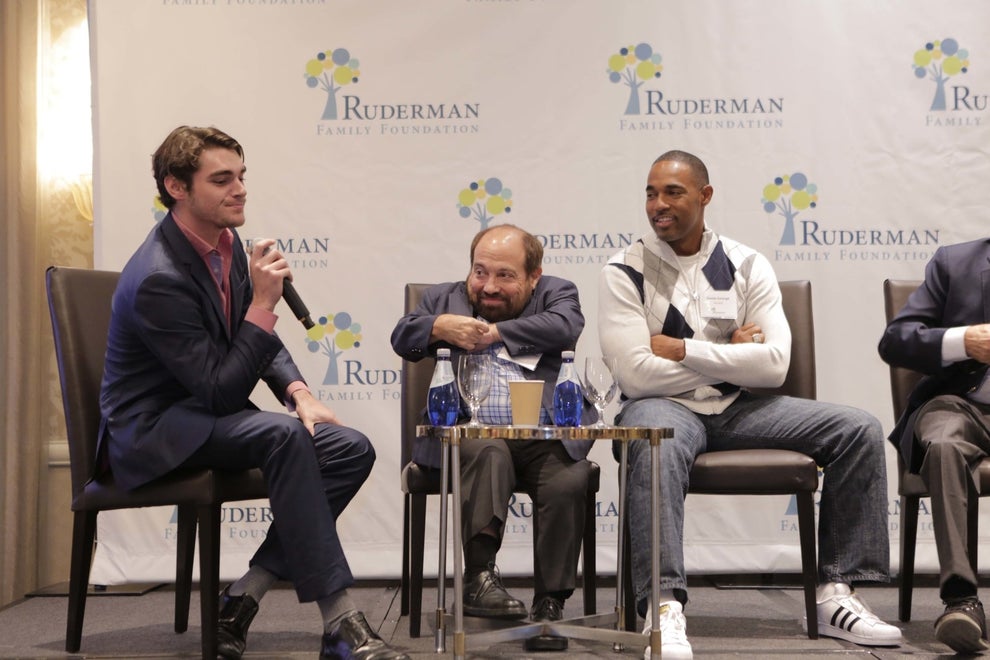
RJ Mitte, Danny Woodburn, and Jason George were on the performers panel. Ruderman Family Foundation
Strange and illogical stereotypes repeatedly undermine the careers of actors with disabilities, Marlee Matlin and Danny Woodburn said this week.
During a panel at the Ruderman Studio-Wide Roundtable on Disability Inclusion on Nov. 1, Matlin, who is Deaf, said some TV- and filmmakers see disability as “baggage” — an extra layer of personal identity that may baffle audiences (or casting directors).
“Sorry,” she said sarcastically to a crowd of around 80 people, many of whom were performers and creators with disabilities. “It’s good baggage. It’s what we need.”
Matlin told a story about an initially promising discussion she had with Jane Campion about playing the lead role of Ada — a nonverbal character — in 1993’s The Piano. Her recollection was that the writer-director said that she was great for the part, but that audiences would be distracted by a known Deaf actor. “And people believe that Al Pacino is really blind in Scent of a Woman?” Matlin said she replied. (Campion did not immediately respond to a request for comment.)
Woodburn, who has dwarfism, recalled a similar reaction during the audition process. “I remember trying to get in on an audition for a doctor, and the feedback I got through my management was that, ‘Oh, he could never be a doctor.’” The idea that he wasn’t believable as a doctor “was absurd to me,” Woodburn said.
In contrast, Woodburn said he’d been asked “on more than one set” to bite another actor on the butt — an unrealistic “humorous” request that scores of creators apparently have accepted as perfectly believable. He’d previously told the Wall Street Journal that he “literally” had it written into his contracts that “there’s no biting on my character’s part.”
The fight for more — and better — representation of people with disabilities in film and television has gained notable traction over the past year: Protests of Me Before You made international news in June, and major mainstream outlets like the Los Angeles Times and the Washington Post have covered the paltry representation of people with disabilities.
But the fight is far from over. For example, when the Academy of Motion Picture Arts and Sciences president Cheryl Boone Isaacs released a statement in January in response to #OscarsSoWhite, she called for “inclusion in all of its facets: gender, race, ethnicity and sexual orientation.” Her omission of disability was something journalists largely failed to note. At the summit, Woodburn said the press “blatantly overlooked disability as part of the diversity discussion.”
Furthermore, disabled actors sometimes lose disabled roles to non-disabled actors (a recent study by the Ruderman Family Foundation found that around 95% of disabled TV characters were played by non-disabled actors). During the panel, Matlin said she had auditioned to play a deaf character, but it ultimately went to a non-deaf woman — and then filmmakers “had the nerve” to ask Matlin to teach the actor “how to be Deaf.”
An impulse to tiptoe around disability can cost actors jobs, too: Matlin said she lost a role in What Women Want to a non-deaf actor because the director thought casting a Deaf woman in the role was too fraught with potential controversy. After the audition, Matlin remembered that the director, Nancy Meyers, had said, “‘You know what? You gave a great performance — thank you — but the character has thoughts of suicide, and I don’t want people to think that deaf people kill themselves.’ I looked at her and I said, ‘Fine, but they do.’” (Meyers did not immediately respond to a request for a comment.)
Speakers during the performers’ panel and the subsequent behind-the-scenes discussion stressed the peculiar position of having to argue for their basic, ordinary humanity — and the fact that characters with disabilities should be as unremarkable as any other characters. Filmmaker Jenni Gold noted that if there were any people with disabilities in Jurassic World’s theme park scenes, she certainly didn’t see them.
“I’m just fighting for the right to get attacked by dinosaurs,” she said.


